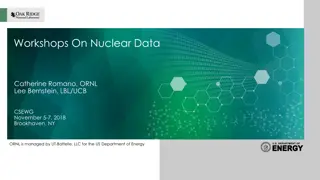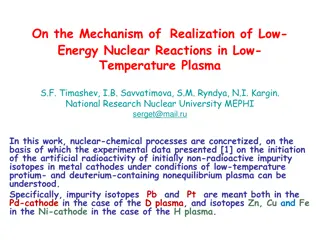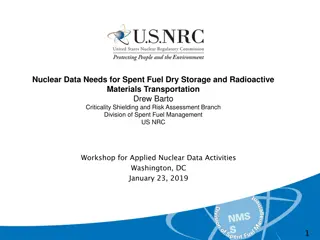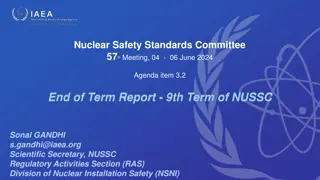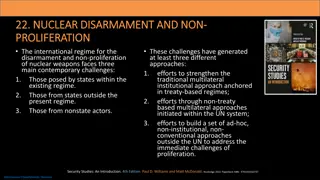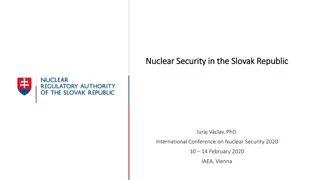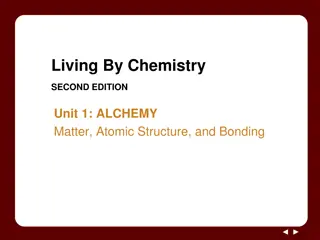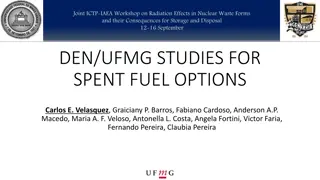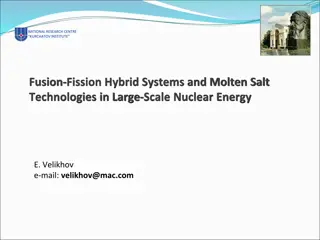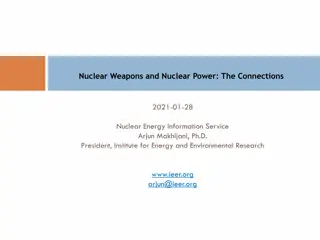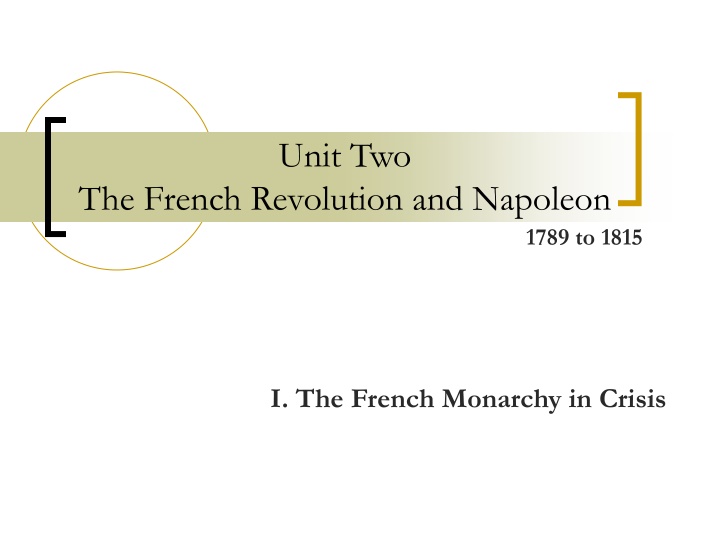
Enhancing Nuclear Safety Regulations
This course focuses on drafting regulations and guides for nuclear safety, utilizing IAEA standards and national legislation to ensure safety in nuclear power infrastructure development. Topics include regulatory oversight, drafting processes, and continuous improvement.
Download Presentation

Please find below an Image/Link to download the presentation.
The content on the website is provided AS IS for your information and personal use only. It may not be sold, licensed, or shared on other websites without obtaining consent from the author. If you encounter any issues during the download, it is possible that the publisher has removed the file from their server.
You are allowed to download the files provided on this website for personal or commercial use, subject to the condition that they are used lawfully. All files are the property of their respective owners.
The content on the website is provided AS IS for your information and personal use only. It may not be sold, licensed, or shared on other websites without obtaining consent from the author.
E N D
Presentation Transcript
Unit Two The French Revolution and Napoleon 1789 to 1815 I. The French Monarchy in Crisis
Economy What is meant by a country s economy? What happens when a country s economy is prospering? Define: Economy The production, distribution, and consumption of goods
Economy Goods Production Distribution Products Making Something Who receives the products and how much they receive What kind of products are purchased Consumption
Notes: Unit Two The French Revolution and Napoleon 2. Estates I. The French Monarchy in Crisis A. Overview of France: 1700 s - richest, most powerful nation in Europe - strong army and navy - philosophers led the Enlightenment - influential in fashions, art and clothes - but was suffering a growing economic crises made difficult by the traditional political/social system - peasants better off than elsewhere but not by much - no serfdom but still had old feudal dues - had to do unpaid service for landlords/monarch - heavy taxes, church tithe, rents - city workers - suffered from inflation because food prices rose - resented privileges of first/second estates c. Third Estate: Commoners - 98% of population - included the bourgeoisie (middle class), peasants, city workers - bourgeoisie resented the privileges of first/second estates - believed in equality and social justice - called for tax reform a. First Estate: Clergy - noble and common - higher clergy lived in luxury and criticized by parish priests - ran churches/schools - kept birth/death records - cared for the poor - collected the tithe (a tax on income) - church owned huge amounts of land and paid no tax b. Second Estate: Nobility - less than 2% of population - great wealth and privileges - exempt from most taxes - rich or poor, most defended traditional privileges - made peasants pay feudal taxes - sought to strengthen political power B. The Old Regime (Anciem Regime) 1. Structure - Monarch has absolute power - centralized power in royal bureaucracy - work to preserve royal authority and social structure - people divided into three estates (classes) - first: clergy; second: nobility; third: commoners
Section Review: page 26 2a. What groups made up each of the three estates in France? First Estate: higher clergy, who were also nobles; parish priests, who were commoners Second Estate: nobility Third Estate: commoners bourgeoisie (middle class), peasants, city workers 2b. What privileges did the First and Second Estates enjoy? Higher clergy: lived in luxury some in Versailles. Owned vast amount of land and paid no taxes. Nobility: many had great wealth; exempt from most taxes; collected feudal dues 3. List three factors that contributed to the French economic crisis of the 1770 s and 1780 s. - poor harvests - trade regulations (tolls) - huge debt - support of American Revolution - borrowed money to support Versailles and fight wars in Europe and overseas - guild monopolies
Notes: Unit Two 3. Reform Attempts: 1774-1776 - Louis appointed Robert Turgot as finance minister - controlled government financial spending - reduced court expenses - removed internal customs taxes on food - limited power of some guilds - Turgot attempted to tax nobles (a major reform) - little success - King needed the parlements to approve this tax but they were controlled by nobles - Nobles of the Robe rejected the idea - King dismissed Turgot in 1776 4. The Writing on the Wall: 1776-1788 - government secured new bank loans - helped only for a little while - 1786: bankers refused to lend more money - 1787 and 1788: had poor harvests - bread shortages upset people - Louis went to Parlements for a new tax, his wishes were rejected - Louis called for the Estates General to meet - The Estates General represented all three estates - Louis hoped to win support for reforms that would restore economic stability C. The Growing Economic Crises 1. In General: 1700 s - economy prospered - population growth 18 million to 25 million - food surpluses helped textile/mining industries (mercantilism: export more than you import) 2. Hardships: 1770 s/80 s - poor harvests - Middle Age regulations - taxing on merchant trade - monopolies by guilds made it difficult for entrepreneurs * government debt high and increasing - to pay for wars - support the Versailles Court - American Revolution doubled debt - Louis XVI was not an able ruler
Definitions Grievances Small to moderate political, economic, or social complaints Crisis Extreme events or complaints which can threaten political, economic, or social stability Reforms Improvement by change which leaves old political and social system basically intact Revolution A sudden profound change which destroys the old political and social system
What were the main causes of the French Revolution? Grievances Crisis Failed Reforms - monarch had absolute power - in 1770 s, economic activity slowed - King Louis didn t back his ministers reforms - First and Second Estates had many privileges - poor harvests - nobles didn t allow themselves to be taxed - clergy collected tithes - regulations from Middle Ages hampered trade and manufacturing - church owned much land - nobles felt only lower classes should be taxed - many nobles enjoyed great wealth - only nobles could become army officers - many custom duties within France - King dismissed Turgot - only nobles could hold high church offices - entrepreneurs could not set up businesses - nobles collected feudal dues from peasants - Third Estate paid most taxes - huge government debt - peasants had to perform unpaid services - bankers refused to lend more money - peasants had to pay taxes, tithes, and rents - bread shortages - peasants were forbidden to kill animals that ate their crops - nobles damaged crops by hunting - city workers suffered from inflation
Unit Two The French Revolution and Napoleon 1789 to 1815 II. A Moderate Start to the Revolution
Define migr Radical Person who flees his or her country for political reasons Extreme Moderate Not extreme, mild Liberty Freedom, being free Equality Condition of being equal Fraternity Brotherly or like brothers Limited monarchy Government in which a monarch s powers are limited, usually by a constitution and a legislative body Republic System of government in which citizens who have the right to vote choose their leaders Constitution A body of fundamental principles according to which a state is governed Reign Rule; the rule of a monarchy
C. Reforms of the Assembly: 1789 August - uprisings forced action from the Assembly - Assembly made huge reforms - abolished most feudal customs - ended serfdom; ended tax exempt privilege of nobles - all male citizens eligible for government/church positions - adopted Declaration of the Rights of Man - democratic principles - equality for all citizens - protection of personal property - influenced by ideas of philosophes - religious reforms: 1789-90 - freedom of worship - control of church given to the government - citizens could elect bishops/priests - selling of church lands - Constitution: 1791 - France a limited monarchy - separation of powers: executive, legislative, judiciary - Montesquieu s three branches - country divided into 83 regions - equal rights to all citizens Notes: II. A Moderate Start to the Revolution A. Estates General to National Assembly: 1789 May-June - each estate elected deputies - 3rd estate wanted all estates to meet together with equal votes for deputies - in the past, estates met separately; had one vote per estate - meant 1st and 2nd estates could outvote 3rd - 3rd estate hoped individual deputies from other estates would support them - King ordered estates to meet separately - 3rd estate declared themselves the National Assembly - claimed the right to write a constitution - Tennis Court Oath - 3rd estate swore not to leave without a constitution - King gave in and estates met together - many division between and within the estates B. Popular Uprisings: 1789 July - peasants and workers in Paris wanted quick action from the Assembly - still faced inflation, unemployment, food shortages - King order troops to Paris; caused more unrest - July 14: Paris crowd stormed the Bastille - peasants in the countryside turned on landlords - raided storehouses, destroyed tax records - conducting own revolution D. Responses: 1791 - many dissatisfied with constitution - some thought it went too far or not far enough - nobles fled France migr s - Royal family tried to flee but failed - kept under guard - demands for end of monarchy and establishment of a Republic - rise of radical parties and their representatives - Maximilian Robespierre
Section Review: page 30 1. Identify: Tennis Court Oath: delegates of the Third Estate and some nobles and clergy swore an oath not to disband until they had a constitution National Assembly: the Third Estate declared itself this in order to write a constitution Declaration of the Rights of Man: adopted by the National Assembly stated the democratic principles that would define the French government Civil Constitution of the Clergy: 1790, gave the government control of the church and allowed citizens to elect bishops and priests 3. Why did the Third Estate want the Estates General to meet as a single body? To avoid being outvoted by the First and Second Estates. If each delegate had a vote then the 3rd Estate, with help from sympathizers from the 1st and 2nd, could win a majority.
Main Event Significance Estates General Summoned - to gain support for economic reform A. B. Third Estate declares itself the National Assembly - to gain support for economic reform Popular uprisings (Paris and peasant revolts) - to gain support for economic reform C. Reforms of the National Assembly - to gain support for economic reform D. E. The Constitution of 1791 - to gain support for economic reform Responses to the Constitution of 1791 - to gain support for economic reform F. G. France at war - to gain support for economic reform H. National Convention - to gain support for economic reform Attacks on the Revolution - to gain support for economic reform I. J. Reign of Terror - to gain support for economic reform
This powerpoint was kindly donated to www.worldofteaching.com http://www.worldofteaching.com is home to over a thousand powerpoints submitted by teachers. This is a completely free site and requires no registration. Please visit and I hope it will help in your teaching.





